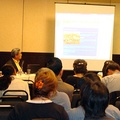That was too much, thought Mrs. K. Not even Bira gave any warning! She didn’t reply, saying only: “I’ll go check it out.”
Confusing the smell of boiled daikon with that of a gas leak made her heart twist in her chest, in embarrassment, perhaps. As if all those times hadn’t been enough, when, from the kitchen door, she would say: “What a weird smell!”
It was on Wednesdays that Mrs. K left a whole pile of daikon-flavored tsukemono ready for the week.
The wall ran from the end of the backyard all the way to the front gate, a corridor separating the houses on each side. Tough luck: both kitchens faced the side of the wall. Bira seemed to live in the same house; after all, the smell of daikon was mingled with the garlic and onions sauteed every day around lunchtime. On this side, only on the days when the cleaning lady showed up. Too bad. What was really delicious was the cologne that she put on every day, even for a short trip to the bakery. She and Mrs. K would meet one another along the way, each bringing home two baguettes – one for breakfast and one for a snack during intermission at their children’s school. Cologne and fresh bread. Bira preferred the bread, for he knew that he would get the chance to chew on the tip.
She was impertinent, stubborn. Even with Bira. That started right after Bira’s arrival. She groused because he cried for several nights. Poor thing, there were strange odors. And the laughter of her boys when Mrs. K’s father was still alive and lived with them. He was given the puppy - one of Sara’s offspring from the workshop - a “vira-lata” [mutt]. The old man pronounced it as “bira rata” Both laughed so hard, and kept on asking him to repeat “bira rata, bira rata” that in the end the mutt’s name became Bira. After that, there were Bira’s various outings into her garden.
“He’s eaten all my pansies, stepped on the snake plant flower bed, and spread mud all over the place!”
“No one told you to leave the gate unlocked,” thought Mrs. K. But the smell of the earth and the flowers was irresistible.
“Bira, dame, dame!”
Don’t do that. In the end, all that was left were the smells coming from this side: she decided to get rid of the garden and cover it with cement. Besides the fact that they bought a car and the front of the house was turned into a garage with an awning. The gate was given a reinforced lock. Her husband even took the boys to the zoo with the new car. That day, Mrs. K sent over a snack of cucumber sandwiches, tomato, and mayo, a recipe from Sato sensei’s book. Bira remained at home, feeling very sad.
Bira was so sweet. He used to stay by the gate, waiting for Mrs. K every morning while she went to the bakery, to the farmer’s market. All that was needed was for him to help push the cart into the kitchen, as it was filled to the brim. In fact, the watermelon arrived split in two. There were so many smells inside that cart: oranges and bananas, the daikon with its leaves for the tsukudani, and always, the bundle of green onions placed on top so it wouldn’t get smashed.
Tuesday was a special day. It was the day of the farmer’s market and the day of Bira’s feast. Ah, all those times when fresh sardines were fried on both sides of the wall.
Sometimes, Mrs. K added a thick sauce smelling of shoyu and sugar. Tuesday was also the cleaning lady’s day. Bira waited for Rosa without anyone telling him that it was Tuesday. Well before 7:30 a.m., Bira was already at the gate. Mrs. K waited for Rosa before leaving for the farmer’s market. She also left home quite early.
“Farmer’s market leftovers are for the poor.”
It was also only on Tuesdays that the smell of garlic and onion stew emanated from both sides of the wall: on one side, aburagohan, sardines, salad, beans, and tsukemono as accompaniment. On the other, rice, beans, fried sardines, sautéed kale with lots of garlic. A feast for Bira!!
One of her sons was always asking Mrs. K’s youngest son to help him solve quadratic equations. Her boys attended the private school located eight blocks from there; Mrs. K’s children studied closer to home, at the public school. She was always asking about their grades, until she gave up one day after discovering that her children weren’t as smart as Mrs. K’s. But they were good ball players: first with marble balls, and later with soccer balls. Unbeatable.
“It can only be the Fontoura bio-tonic that gives so much energy to those wooden-legged sons of yours. Could you leave Bira on a leash somewhere because he’s always hindering the boys’ soccer match?”
“But it’s Wakamoto [Japanese medicine found in Brazil] that makes children smart...”
One day, the oldest one ran over to tell his mother that Mrs. K’s boys ate rice and beans baked in one single pan.
“That’s baião-de-dois [Brazilian rice and beans dish], my son.”
On another day, he climbed on a little stool to ask another question about beans.
“What? You bake beans with sugar?”
“That’s because there’s some azuki left over, so I’m making zenzai. Do you want to taste it?”
“???. Well, if we can make sweet rice, why not sweet beans? They’re “brothers” [referring to rice and beans, a typical Brazilian food combo] even when it comes to that.”
Bira merely leaned his head to the side, trying to follow the conversation.
It was at that time, when the boys were about twelve or so. Mrs. K remembers very well a torment that lasted a number of months. Her niece was going to get married, and they would be the best man and woman at the wedding. What kind of fabric and style for the long dress? The color scheme had already been arranged, so that the clothes of the best women wouldn’t look mismatched.
“I don’t look very good in aqua green, but that’s all right...”
It was chaos to decide on which fabric to buy, to go to Mrs. K’s seamstress friend, to help select the style. A wraparound dress with a belt in the front.
“Just like a kimono,” said Mrs. K.
“No, it’s not. It’s from Burda magazine!!”
That was when Mrs. K entered her house for the first time. She had never gone through the locked gate. Such a beautiful house! So tidy! Chic! From the outside, one could see that there were two curtains: one made out of a fine, transparent fabric; the other made out of a thick fabric that was pulled every night. But from the outside one couldn’t see the pullers with pom poms at the tip. And the sofas, the chandelier, the rugs, the china cabinet filled with glasses, the big picture on the wall. Her kitchen had a colored linoleum floor and a fold-away table. But in all fairness: her refrigerator was smaller. Mrs. K looked ill at ease when she thought of her own house. It didn’t have any of that luxury. She admitted to herself that it was somewhat messy, the house of a nihonjin. Even her laundry area was well kept, mixing the smell of Rinso soap that Bira loved and Bleach - horrible. In her own backyard, Mrs. K hung finely cut strips of daikon under the small roof that was used to dry clothes on rainy days. When there was no rain, the daikon was dried out; always the daikon.
During those months before her niece’s wedding, Mrs. K used to run over to her house each time she called her over through the wall. Bira would get frightened because that generally took place after lunch, the hour of his siesta. He used to wait outside the house because he might bump against something or, even worse, shed hair on the rug. He sensed the mixture of cologne, wax, pineapple, and sometimes black coffee that she served on a silver platter. Finally, the Saturday of the wedding arrived. She went really early to the hairdresser, Mrs. Tizuko, Mrs. K’s friend who had a salon on the same street as the farmer’s market. She returned with her hands all stretched out so as not to smudge the red nail polish. Her hair was full of hairspray to keep the bun in place, which helped to highlight both her face and the style of her dress. Once again, Mrs. K was called to give the final verdict. She looked beautiful with her face full of powder, and mascara on the cheeks. Her shoes were golden and had pointed heels, with a golden pocketbook carrying a compact powder puff and lipstick inside, everything matched.
It took them a long time to return. Only on Sunday morning did she find out. Mrs. K found it strange because she always went to mass at 8 a.m., but on that day she didn’t go out. She was probably tired. But no. She had her right arm in a cast. She wasn’t used to high heels and took a fall after tripping on one of the steps of the grand room at the church. It was going to be one month in a cast. And the right arm, too. What now? Mrs. K had to perform twice as much work. A wall was no obstacle for her to send over some fresh bread, take two trips to the farmer’s market, help the young woman to prepare lunch until her children returned home. At night, they made sandwiches, which was easier.
That was nothing; the month went by very quickly. They went back to worrying about their children’s schedule, about their husbands, about the bakery, the farmer’s market. Bira once again began lamenting that they sautéed garlic and onions on Tuesdays only on his side of the wall. That month was so good!!
The other instance took place later on, after the boys had already turned into young men. The older ones had already graduated, while Mrs. K’s youngest one was studying Engineering at a college in Campinas; only her youngest son was still attending college prep classes for the third time, stubbornly insisting that he wanted to become a physician. Bira found it strange. The smell from his side of the wall could also be felt coming from the other side...
“Turnips are very healthy, they have a lot of fiber and are great for salads. And they’re delicious if you add soy cheese paste to them. The doctor told me that soy cheese has few calories, besides being great for the menopause.”
Turnips and daikon, soy cheese and tofu. “Hmmm,” thought Mrs. K. Did the doctor say anything about the smell?
Months later, she felt some back pain that not even the arnica ointment took care of. Then, she learned about the moxabustion novelty! She described in detail this miraculous therapy, until Mrs. K discovered that it was the moxibustion that her father used to practice. “That’s hardly something new!” She said that she would remain at the clinic to practice shiatsu to prevent the back pain from returning, and even asked Mrs. K if she should take baths with ofuro and chocolate to smoothen her skin. The only problem is that it’s expensive...
Run – run from the other side of the wall.
Mrs. K went on ruminating for a long time. The thoughts would come and go. She was unable to escape from that torment: could it have been because of that umeboshi that hadn’t been fully dried? I think it was still too salty. But she kept asking for it, saying that it was digestive, that it prolongs life, so I gave it to her. No, it couldn’t have been only that. Now, how am I going to find out? Also, she was persistent, calling me so often that even Bira got annoyed...
The car left the garage in the middle of the night, awakening Bira. When the car returned, Bira didn’t feel the smell of cologne. He never would again.
These days, garlic and onions are sautéed only once a week. Sometimes, he can smell the daikon-flavored tsukemono that comes along with the little sushi platter that the oldest son buys at the market for his father’s dinner. The youngest one is finally doing residency.
And of late, on Mrs. K’s side of the wall, Bira feels a strong smell coming out of the little smoke trail that MRs. K’s husband lights each morning. He doesn’t like it, but remains by his side. The oldest son has gotten married; the engineer is studying in Canada. Bira keeps the husband company. He doesn’t go out. Since that Tuesday, Mrs. K stopped going to the farmer’s market in the early hours of the morning. She stopped opening the door to Rosa. No sardines nor tsukemono. No more daikon being dried under the little roof. It’s empty.
It’s been a while. Her husband used to go out every morning, wearing a suit; he would walk to the bus stop. He’d only return in the afternoon. Mrs. K’s husband also went out every morning, wearning a suit, but he waited for his coworker who would stop by with the company car. He also returned in the afternoon. He’d say Hello, and exchange a few words with those who lived on the street. Now, Mrs. K’s husband invites her husband for a glass of beer each time the oldest son takes the kids to Sunday barbecues. Meat, beer, and the daikon tsukemono bought at the little neighborhood store go along quite well, her husband agrees.
They stare, Mrs. K and her. It’s strange that the wall that went from the end of the backyard to the gate is no longer there. Daikon or gas leak? Cologne or garlic and onions? Funny, the wall has vanished... They can only see Bira if he lies on his side, holding his paws close to his body. Dame, dame, Bira, stop it, stop it...
© 2013 Celia Sakurai





